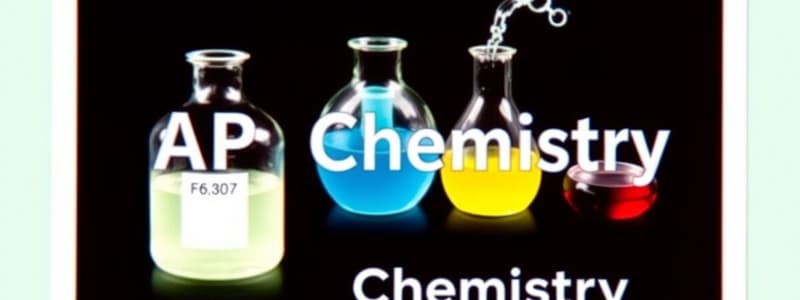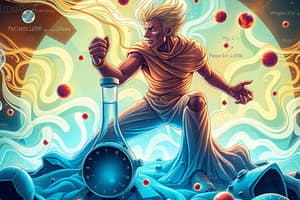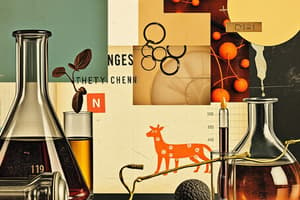Podcast
Questions and Answers
What is chemistry?
What is chemistry?
- The scientific discipline that treats the composition, properties, and transformations of matter. (correct)
- A branch of physics.
- The art of cooking.
- The study of biological organisms.
What is matter?
What is matter?
Anything that occupies space and has mass.
Define property in terms of chemistry.
Define property in terms of chemistry.
A characteristic that gives a sample of matter its unique identity.
What is an element?
What is an element?
What is an atom?
What is an atom?
Define molecule.
Define molecule.
What are the states of matter?
What are the states of matter?
What is gas?
What is gas?
Define liquid.
Define liquid.
What is a solid?
What is a solid?
What is a pure substance?
What is a pure substance?
Define compound.
Define compound.
What is a mixture?
What is a mixture?
Define the law of constant composition.
Define the law of constant composition.
What is a heterogeneous mixture?
What is a heterogeneous mixture?
Define homogeneous mixture.
Define homogeneous mixture.
What is a solution?
What is a solution?
What are physical properties?
What are physical properties?
Define chemical properties.
Define chemical properties.
What is an intensive property?
What is an intensive property?
Define extensive property.
Define extensive property.
What is a physical change?
What is a physical change?
Define changes of state.
Define changes of state.
What is a chemical reaction?
What is a chemical reaction?
What are SI units?
What are SI units?
Define mass in scientific terms.
Define mass in scientific terms.
What is temperature?
What is temperature?
What is the Celsius scale?
What is the Celsius scale?
Define the Kelvin scale.
Define the Kelvin scale.
What is absolute zero?
What is absolute zero?
Define density.
Define density.
What is precision in measurement?
What is precision in measurement?
Define accuracy.
Define accuracy.
What are significant figures?
What are significant figures?
Flashcards
What is matter?
What is matter?
Anything that occupies space and has mass.
What is chemistry?
What is chemistry?
The study of the composition, properties, and transformations of matter.
What is a property in chemistry?
What is a property in chemistry?
A characteristic that gives unique identity to a sample of matter.
What are elements?
What are elements?
Signup and view all the flashcards
What are atoms?
What are atoms?
Signup and view all the flashcards
What are molecules?
What are molecules?
Signup and view all the flashcards
What is a gas?
What is a gas?
Signup and view all the flashcards
What is a liquid?
What is a liquid?
Signup and view all the flashcards
What is a solid?
What is a solid?
Signup and view all the flashcards
What are pure substances?
What are pure substances?
Signup and view all the flashcards
What are compounds?
What are compounds?
Signup and view all the flashcards
What are mixtures?
What are mixtures?
Signup and view all the flashcards
What are heterogeneous mixtures?
What are heterogeneous mixtures?
Signup and view all the flashcards
What are homogeneous mixtures (solutions)?
What are homogeneous mixtures (solutions)?
Signup and view all the flashcards
What is the Law of Constant Composition?
What is the Law of Constant Composition?
Signup and view all the flashcards
What are physical properties?
What are physical properties?
Signup and view all the flashcards
What are chemical properties?
What are chemical properties?
Signup and view all the flashcards
What are intensive properties?
What are intensive properties?
Signup and view all the flashcards
What are extensive properties?
What are extensive properties?
Signup and view all the flashcards
What are physical changes?
What are physical changes?
Signup and view all the flashcards
What are changes of state?
What are changes of state?
Signup and view all the flashcards
What are chemical reactions?
What are chemical reactions?
Signup and view all the flashcards
What are SI units?
What are SI units?
Signup and view all the flashcards
What is mass?
What is mass?
Signup and view all the flashcards
What is temperature?
What is temperature?
Signup and view all the flashcards
What is the Celsius scale?
What is the Celsius scale?
Signup and view all the flashcards
What is the Kelvin scale?
What is the Kelvin scale?
Signup and view all the flashcards
What is density?
What is density?
Signup and view all the flashcards
What is accuracy in measurement?
What is accuracy in measurement?
Signup and view all the flashcards
What is precision in measurement?
What is precision in measurement?
Signup and view all the flashcards
What are significant figures?
What are significant figures?
Signup and view all the flashcards
Study Notes
Chemistry Overview
- Chemistry studies the composition, properties, and transformations of matter.
- Matter is defined as anything that occupies space and has mass.
Properties of Matter
- A property is a characteristic that gives unique identity to a sample of matter.
- Elements cannot be separated into simpler substances by chemical means.
Atomic and Molecular Structure
- Atoms are the smallest representative particles of elements.
- Molecules consist of two or more atoms chemically combined.
States of Matter
- Matter exists in three states: solid, liquid, and gas.
- Gases have no fixed volume or shape; they occupy the shape and volume of their container.
- Liquids have a definite volume but take the shape of their container.
- Solids have both a definite shape and definite volume.
Types of Substances
- Pure substances have a fixed composition and distinct properties.
- Compounds are made of two or more elements united chemically in definite proportions.
- Mixtures consist of two or more substances that retain their individual identities.
Mixture Classifications
- Heterogeneous mixtures have varying composition and properties throughout.
- Homogeneous mixtures, or solutions, have a uniform composition and appearance.
Composition Laws
- The Law of Constant Composition states that the elemental composition of a pure compound is always the same.
Properties of Substances
- Physical properties can be measured without altering the substance, such as color and freezing point.
- Chemical properties describe how substances react and change into other substances.
Intensive vs. Extensive Properties
- Intensive properties do not depend on the amount of material, e.g., density.
- Extensive properties depend on the amount of material, such as mass and volume.
Changes in Matter
- Physical changes occur without changing the chemical composition, e.g., phase changes.
- Changes of state involve transformations between solid, liquid, and gas.
- Chemical reactions convert one or more substances into different substances.
Measurements in Chemistry
- SI units are standard metric units used in science, including kilograms, meters, seconds, kelvins, moles, amperes, and candelas.
- Mass measures the amount of material in an object, with SI units measured in kilograms.
- Temperature indicates molecular activity, measured on Celsius and Kelvin scales.
Temperature Scales
- Celsius scale: water freezes at 0 degrees and boils at 100 degrees.
- Kelvin scale is the absolute temperature scale, starting from absolute zero (0 K).
Density and Measurement Quality
- Density is the ratio of mass to volume.
- Precision refers to the closeness of agreement among several measurements.
- Accuracy measures how closely measurements agree with the correct value.
Significant Figures
- Significant figures indicate the precision of a measurement, including all the digits that carry meaning contributing to its measurement accuracy.
Studying That Suits You
Use AI to generate personalized quizzes and flashcards to suit your learning preferences.




